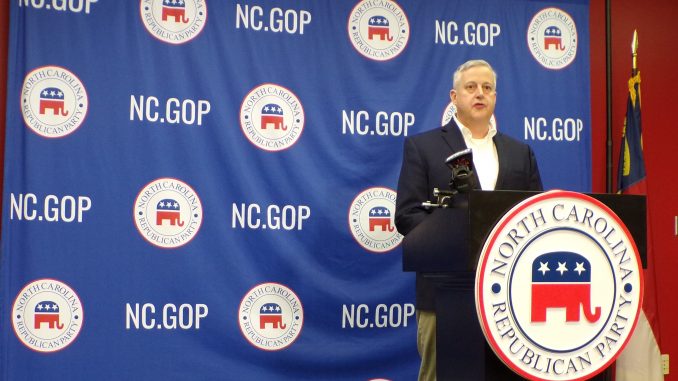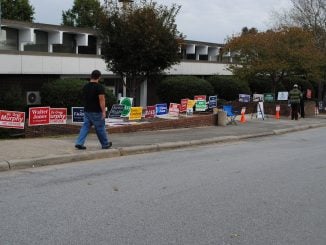
RALEIGH — At a press conference on Friday, the North Carolina Republican Party (NCGOP) commented on the cancelation of the Republican National Convention in Florida and also detailed objections to a recent “emergency order” issued by the State Board of Elections (NCSBE).
NCGOP Chairman Michael Whatley also said today that they “strongly support” President Trump’s decision on July 22 to cancel the Republican National Convention celebration events in Jacksonville due to concerns arising from the current apparent spread of COVID-19 in Florida.
“The health and safety of the convention delegates, alternates, guests and staff along with the public are the highest priority for President Trump and the Republican Party and were the driver for this decision,” said Whatley, adding thanks to the convention team for all their work.
Whatley said that the NCGOP sent a formal letter to the NCSBE regarding the “emergency order” issued by NCSBE Director Karen Brinson Bell late on Friday, July 17. Bell, a former county elections director, was voted in as the new director for the NCSBE via a 3-2 party line vote in May of 2019. She replaced Kim Strach who had held the role since 2013.
The NCGOP’s letter says that the order is “procedurally defective” and that it discriminates against rural counties.
“We are concerned that the actions taken in the Emergency Order have not been authorized by either statute or NCSBE regulations,” reads the letter. The letter goes on to explain that with regard to emergency powers the NCSBE has not adopted any rules “actually describing the powers that may be exercised.”
The NCGOP letter also says the NCSBE has violated general statute and the agency’s own rules by using population instead of geography to determine access to early voting.
“Because the Emergency Order is based on population density rather than geography, it disproportionately benefits the Democratic Party, which has significantly more voters in the counties that will be forced to open additional early voting locations under the Order,” the letter says.
The NCSBE’s July 17 order does use registered voter populations to dictate adding early voting sites by requiring each county to have at least one early voting site for every 20,000 registered voters based on voter registration totals as of July 11, 2020. The language, however, appears to leave it open for a county to hypothetically add more than one per 20,000. Based on that formula, the order may require some 23 counties to expand the number of early voting sites for the 2020 election.
The NCGOP letter uses the counties of Wake and Cherokee as examples to highlight the order’s discrimination between urban and rural areas.
Cherokee, which spans 497 miles, operated one early voting site in 2016 and under the order will only have to open one in 2020. The NCGOP letter points out that a Cherokee County voter who lives in the town of Topton would have to drive around 25 miles to reach the Cherokee County Board of Elections building (the only early voting site in 2016). Cherokee County’s largest voting block is Republican. The county has 10,211 Republicans, 7,101 registered Unaffiliated and 4,203 Democrats.
Counties like Wake, which has 764,514 registered voters, the order would mean the possible addition of 38 more early voting sites. County officials in Wake had already approved 20. Wake County’s largest voting block are Unaffiliated voters with 294,175, followed by Democrats with 279,903 and Republicans with 184,246. The situation would be similar in Mecklenburg County which has 758,697 registered voters, nearly half of which are Democrats. Mecklenburg broken down by affiliation has 327,021 Democrats, 260,986 Unaffiliated voters and 164,816 Republicans.
The NCGOP asks in their letter that the NCSBE “withdraw the Emergency Order and engage in a formal Rulemaking Process,” by seeking input from “counties, members of elections boards, political parties and other stakeholders prior to issuing any changes to the election process for the 2020 General Election.”
If the order is not withdrawn, the NCGOP asks the NCSBE to amend the order to open at least one early voting site per 20,000 registered voters in a county or “one early voting site for every 100 square miles or major fraction thereof in a county, whichever produces a greater number of early voting sites within the county.” In addition, the order should be amended to require county board of elections to open least four early voting sites. The NCGOP has requested the NCSBE respond to their letter “on or before July 31, 2020.”
No legislators were notified prior to the order being announced which raised concerns from Sen. Ralph Hise (R-Mitchell), one of the co-chairs of the Senate Elections Committee.
“It should raise red flags for everybody when the Board of Elections, which is controlled by one political party, issues an ’emergency’ order late in the afternoon on a Friday. It’s an open question as to whether this order is even legal,” said Hise in a statement.
Hise also said that there is “major cause for concern about this late-afternoon partisan rule.”
“It appears that areas with high concentrations of Democrats will have dozens of early voting sites while more Republican areas may have just one,” Hise said. “How is it fair or equitable for voters of one party to be able to walk down the street to vote early, while voters of another party will need to drive for miles and miles to vote early?”
County election boards have already expressed concerns in staffing current in-person voting sites due to COVID-19. The “emergency order” forces those boards not only to add more early voting sites, but also to keep those sites open for 17 consecutive days. The order also stipulates that for the first and second weekends of that early voting period, the sites must be open “a minimum of 10 hours a day.” Under the order, counties have until July 31 to file their plans or request a waiver.


